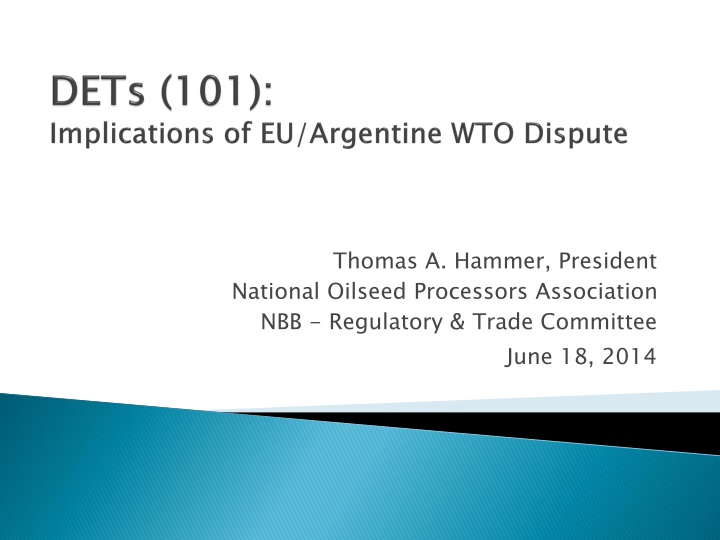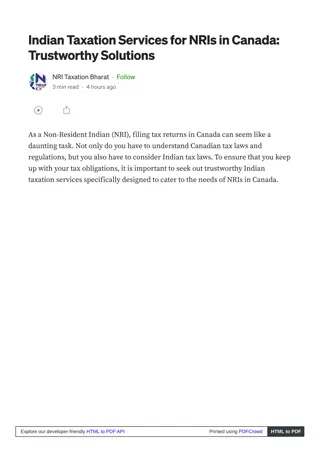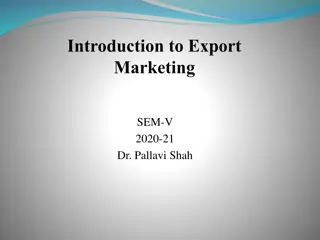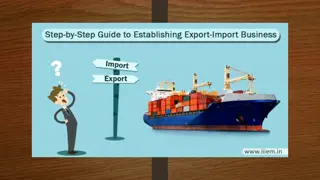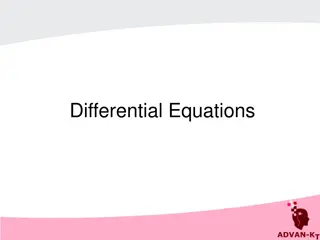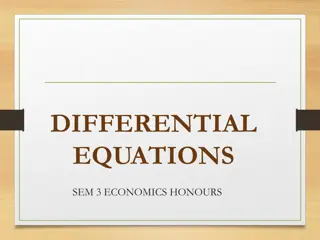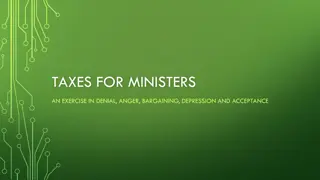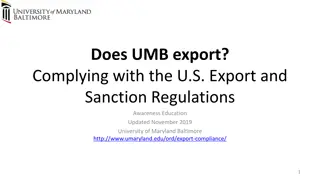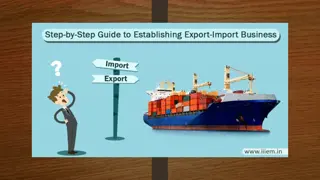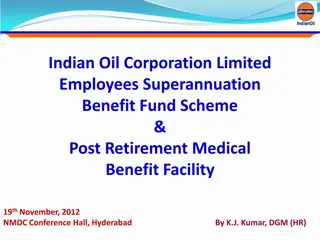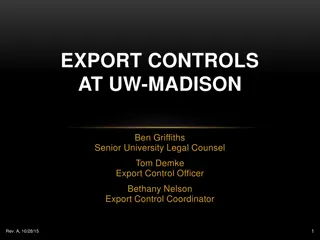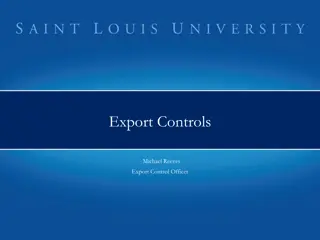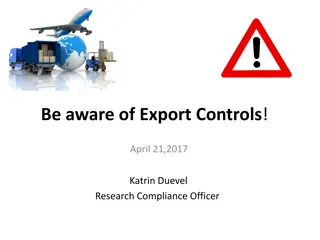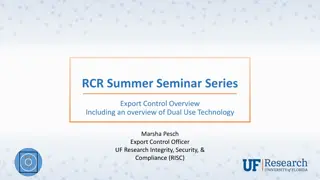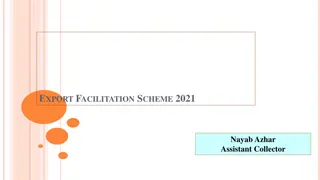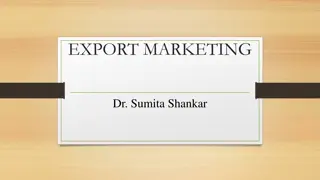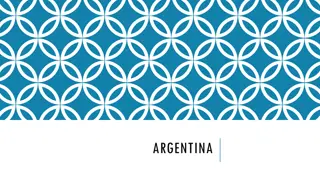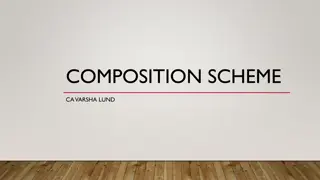Argentina's Differential Export Tax Scheme
Argentina implements a scheme of export taxes to support its domestic soybean processing industry, allowing processors to purchase soybeans below world prices and earn higher profits when exporting processed products. This advantage puts pressure on competitors and affects global trade dynamics. The World Trade Organization rules do not directly address these taxes, highlighting the need for their classification as export subsidies.
Download Presentation

Please find below an Image/Link to download the presentation.
The content on the website is provided AS IS for your information and personal use only. It may not be sold, licensed, or shared on other websites without obtaining consent from the author.If you encounter any issues during the download, it is possible that the publisher has removed the file from their server.
You are allowed to download the files provided on this website for personal or commercial use, subject to the condition that they are used lawfully. All files are the property of their respective owners.
The content on the website is provided AS IS for your information and personal use only. It may not be sold, licensed, or shared on other websites without obtaining consent from the author.
E N D
Presentation Transcript
Thomas A. Hammer, President National Oilseed Processors Association NBB - Regulatory & Trade Committee June 18, 2014
In order to encourage the development and growth of its domestic soybean processing sector and the export of processed soybean products, Argentina has for many years maintained a differential export tax (DET) scheme on oilseeds and oil products. The current scheme maintains an export tax of 35% on soybeans and 32% on soybean meal and soybean oil. The nominal export tax rate on biodiesel is 20% with an effective rate of 14.58% - taking into account a tax rebate. The net effect of the system is to allow Argentina s soybean processors to purchase soybeans in the internal market for about 65% of world prices and earn as much as 68% of the world price for soybean products when exported. When soybeans are worth $500/MT in the world market, this translates into a de facto subsidy to Argentina s soybean processors of about $15/MT.
Because of the advantage Argentinas processors receive from DETs, they are able to discount the export price of their soymeal, soy oil and biodiesel exports to gain market advantage and still make good margins. This increases competitive pressure on oilseed processors and biodiesel manufacturers in importing countries. By restricting exports of whole soybeans from Argentina, the DETs reduce the supply and raise the price of soybeans available to soybean processors in importing countries. Without DETs, soybean processors in importing countries would have access to more soybeans and face reduced competition from imported soybean meal and soybean oil.
World Trade Organization (WTO) rules restrict direct export subsidies by member countries. However, there is currently nothing in WTO rules that specifically address DETs because there is no direct subsidy payments to processors and exporters the benefits are the result of differentials in taxes rather than payments. Yet, the effects of DETs are the same as if direct payments were made to processors and exporters. It is important that DETs be classified as export subsidies under the WTO.
40 35 30 25 20 15 10 5 0 1991/1992 1994/1995 1997/1998 2000/2001 2003/2004 2006/2007 2009/2010 2012/2013 Soybeans Soybean Products
100% 90% 80% 70% 60% 50% 40% 30% 20% 10% 0% 1991/1992 1994/1995 1997/1998 2000/2001 2003/2004 2006/2007 2009/2010 2012/2013 Soybeans Soybean Products
Brazil maintained its own DETs prior to 1996 as a way to subsidize its oilseed processors and promote oilseed products exports. Between 1993 - 1996, Brazil s soybean crushing capacity equaled 160 200% of soybean production However, the DETs were eliminated in 1996 as part of policy reform effort. The result was a stabilization in soybean product exports and a sustained increase in exports of whole soybeans. Brazil s soybean processing capacity declined to less than 100% of soybean production and the proportion of soybeans crushed in Brazil fell from over 80% to about 50%.
50 40 30 20 10 0 1991/1992 1994/1995 1997/1998 2000/2001 2003/2004 2006/2007 2009/2010 2012/2013 Soybeans Soybean Products
90% DETs Eliminated 80% 70% 60% 50% 40% 30% 20% 10% 0% 1991/1992 1994/1995 1997/1998 2000/2001 2003/2004 2006/2007 2009/2010 2012/2013 Soybeans Soybean Products
In 2012, European Biodiesel Board (EBB), representing the major biofuels producing industry in the EU, lodged a legal complaint against unfair biodiesel exports from Argentina and Indonesia. Nov. 27, 2013, EU Reg. 1194/2013 imposed definitive anti- dumping duties on imports of biodiesel from Argentina and Indonesia. The level of import duties ranges from 216 to 245 /tonne for Argentinean producers and from 145 to 178 /tonne for Indonesian producers they remain in place for 5 years. This regulation clearly states that the domestic prices of the main raw material used by biodiesel producers in Argentina and Indonesia were found to be artificially lower than the international prices due to the distortion created by the Argentine and Indonesian export tax system.
EU Reg. 1194/2013 states the DET system in Argentina and Indonesia : distorts the costs of production for biodiesel producers in these countries, depresses the domestic prices of the raw material input to an artificially low level and, as a consequence affects the costs of the biodiesel producers in both countries. The Regulation further states that: In the present case it was established that the costs associated with the production of the product concerned are not reasonably reflected in the records of the companies concerned as they are artificially low due to the distortion caused by the Argentine DET system. This holds true regardless of whether or not DET systems in general may be as such contrary to the WTO Agreement.
EBBs Nov. 26, 2013 Press Release states, This (EU Regulation) is an important historical step in the fight against the unfair dumping effects of DETs in international trade. We are proud that EBB is behind this historical step for International trade law in the agri-food sector. NOPA agrees! have DETs eliminated in the General Agreement on Tariffs & Trade (GATT) and the World Trade Organization (WTO). History of NOPA s efforts include: Uruguay Round Agricultural Agreement (URAA) Doha Agricultural Framework Agreement (WTO) Requested USTR to bring a WTO case against Argentine DETs WTO Dispute Settlement Case between European Union & Argentina NOPA agrees! For over 30 years, NOPA has been struggling to
WTO members have agreed that if they believe fellow- members are violating trade rules, they will use the multilateral system of settling disputes instead of taking action unilaterally. That means abiding by the agreed upon procedures, and respecting WTO s judgments. A dispute arises when one country adopts a trade policy measure or takes some action that one or more fellow-WTO members considers to be breaking the WTO agreements, or to be a failure to live up to obligations. A third group of countries can declare that they have an interest in the case and enjoy some rights. At the first Dispute Settlement hearing, the complaining country (or countries), the responding country, and those that have announced they have an interest in the dispute, make their case at the panel s first hearing.
On December19, 2013, Argentina requested consultations with the EU regarding a) biodiesel originating in Argentina, as well as the investigation underlying the measures; and b) 2009, which refers to the adjustment or establishment of costs associated with the production and sale of products under investigation in the determination of dumping margins. Argentina claims that the measures are inconsistent with numerous provisions of the Articles of the GATT. On January 9, 2014, Russia requested to join the consultations. On January 15, 2014, Indonesia requested to join the consultations. Subsequently, the European Union informed the Dispute Settlement Body (DB) that it had accepted the request of Indonesia to join the consultations. provisional and definitive anti-dumping measures imposed on a provision in Council Regulation (EC) 1225/2009 of November
On March 13, 2014, Argentina requested the establishment of a panel. At its meeting on March 26, 2014, the DSB deferred the establishment of a panel. On April 25, 2014, the Dispute Settlement Body (DSB) established a panel not yet composed. Australia, China, Malaysia, Norway, Russia, Saudi Arabia, Turkey and the United States reserved their third-party rights. Subsequently, Colombia, Indonesia and Mexico reserved their third-party rights. On June 10, Indonesia notified the WTO Secretariat of a request for consultations with the EU concerning anti- dumping measures imposed on imports of biodiesel into the EU.
Ensure that the US Government - as a Third Party to the pending WTO dispute settlement case between the EU and Argentina/Indonesia makes a strong declaration that due to the trade distorting effects of DET tax systems, as demonstrated in this trade case, DETs should after three decades be classified as an agriculture export subsidy within the definitions of the WTO. Agriculture DETs are employed by numerous WTO Members, including Argentina, Indonesia, Malaysia, Russia and the Ukraine & growing!
